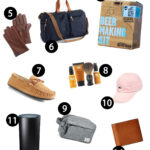Preparing for a new baby is an exciting time, especially for parents who are already navigating the joys of raising children. If you’re welcoming a new little one into your family, you’re likely focused on many things, and a significant part of that preparation is considering your older children. From logistical arrangements during birth to adjusting routines, and most importantly, emotionally preparing them for a new sibling, there’s a lot to consider.
While no single action can fully prepare a child for the life-changing arrival of a new brother or sister, proactive steps can significantly ease the transition. Open conversations about the upcoming baby, engaging storybooks about becoming a big sibling, and presenting a special sibling gift are all wonderful ways to pave the way for a positive sibling relationship right from the start.
This guide offers valuable insights and practical tips on how to prepare your children for the arrival of a new baby and provides a wealth of inspiring gift ideas perfect for big sisters and big brothers.
Preparing Your Child for a New Sibling: A Guide by Age
Preparing your existing children for a new sibling before the baby arrives is incredibly beneficial. Consider that until now, their world, in many ways, has revolved around them. Even in larger families, a new baby brings a significant shift in the family dynamic.
It’s a common anecdote among parents about the sometimes humorous, sometimes poignant, misunderstandings children have about new babies. You might hear questions like, “When are we taking the baby back to the hospital?” highlighting their innocent confusion about this permanent new family member.
The most effective approach to preparing your child for a new sibling is heavily influenced by their age. A five or six-year-old will naturally grasp the concept more readily than a toddler. For families with children close in age, one advantage is that the older child will adapt quickly, as they won’t recall life without a sibling.
Regardless of the age gap, thoughtful preparation is always a valuable investment in your family’s harmony and your children’s evolving relationships.
Age-Appropriate Tips to Prepare Siblings
Drawing from personal experiences and insights shared by numerous parents, here’s a comprehensive guide tailored to different age groups to help you prepare your children for a new baby:
Preparing Toddlers (1-2 Years Old)
- Engage with Big Sibling Books: Introduce the concept of a new baby through age-appropriate books. Board books are excellent for this age group, featuring simple language and engaging illustrations that depict the joys of becoming a big brother or sister.
- Involve Them in Baby Preparations: Let your toddler see and even “help” with setting up baby items. Talk about how these items are for the “baby.” This tangible involvement helps them understand the reality of a new family member arriving.
- Connect with Baby in Utero: Allow your toddler to feel the baby kicking in your belly. For this age, babies in mama’s tummy are abstract. Feeling movement makes the concept more real and exciting.
- Introduce Babies in Real Life: Visit friends with babies or point out babies in public. Talk about what babies do – they sleep, eat, cry, and need gentle care.
- Practice Baby Care with Dolls: Use dolls or stuffed animals to role-play gentle baby care. Emphasize being gentle and quiet around babies. This can start even with children as young as 10-12 months.
- Explain Newborn Behavior: Toddlers around two years old can start to understand simple explanations about newborns. Explain that newborns mostly sleep, eat, and need lots of help.
- Utilize Sibling-Themed Media: Watch age-appropriate shows or videos about new siblings. Daniel Tiger’s Neighborhood offers excellent content about welcoming a new baby. PBS provides helpful resources related to this theme.
Preparing Preschoolers (3-6 Years Old)
- Interactive Reading with Open-Ended Questions: Continue reading big brother and big sister books, but now engage your preschooler more actively. Ask open-ended questions about the stories and encourage them to express their feelings and curiosities about the new baby. Let their questions guide the conversation.
- Storytelling About the Birth Process: Explain what will happen when it’s time for the baby to be born, especially the part where you go to the hospital. Disruptions to routine can be challenging for preschoolers. Storytelling can mentally prepare them for these changes and reduce anxiety.
- Realistic Newborn Expectations: Preschoolers might expect a baby to immediately play with them. Explain that newborns cannot play right away, and describe what newborns actually do: eat, sleep, cry, and need help with everything.
- Share Their Babyhood Memories: Look at photos and videos of when your preschooler was a baby. Share stories about how you cared for them as a newborn. This helps them connect to the baby’s needs and understand the cycle of care.
- Engage Them in Baby Preparations: Preschoolers can actively participate in getting ready for the baby. They can help wash baby clothes, organize the diaper changing station, and even try out baby gear like strollers.
- Practice Playtime Scenarios: Use dolls to practice how to interact with a baby. Role-play gentle interactions and quiet play around a newborn.
- Brainstorm Quiet Activities: Involve your preschooler in creating a list of quiet activities they can do while the baby is sleeping or needs quiet time. This proactive approach empowers them and gives them options during times when your attention is focused on the baby.
- Sibling-Focused Media Reinforcement: Re-watch Daniel Tiger’s New Baby episodes and explore PBS Daniel Tiger resources. Repetition and familiarity with these resources can be very comforting and educational for preschoolers.
Preparing Elementary School Children (6-10 Years Old)
- Acknowledge the Significance of the Change: Even older children need intentional preparation. Acknowledge that a new baby is a big change for the entire family and that their feelings are valid. Open communication is key.
- Give Them Meaningful Roles in Preparation: Elementary-aged children can take on more responsible roles in preparing for the baby. They can assist with organizing the baby’s space, decorating the nursery, and choosing baby items. Feeling involved fosters a sense of connection and anticipation.
- Establish Realistic Expectations and Roles: Discuss the realities of newborn care and how much attention babies require. Brainstorm ways they can help, activities they can do independently while you care for the baby, and things you can all do together with the baby. A concrete list can be very reassuring and help manage expectations.
- Adapt Preschool Strategies: Many strategies used for preschoolers can be adapted for older children. Tailor the conversations and activities to their maturity level. For instance, instead of simple role-playing, engage in more in-depth discussions about responsibility and empathy.
Related Reading: Essential Postpartum Recovery Items for New Moms
Creating a Thoughtful Sibling Gift Basket
A wonderful tradition to start is creating a sibling gift basket for your older child. This gift is presented “from the baby,” and telling your child about this special gift in advance builds excitement for the baby’s arrival.
The goal is to make your older child feel incredibly special and valued during this significant family transition. Think of it as creating a “Christmas morning” atmosphere to associate positive feelings with the arrival of the new baby.
There’s no single “right” way to create a sibling gift. Whether you opt for a grand basket overflowing with goodies or a single, carefully chosen item, the sentiment is what truly matters.
Personal Experience: Sibling Gift Basket Insights
My experience with a sibling gift basket was very positive. My older child, Walter, was thrilled with his gifts and genuinely enjoyed them. However, reflecting on it, I believe distributing the gifts over a couple of weeks might have prolonged the excitement and engagement.
Consider a slightly smaller basket for the initial meeting, followed by a few additional treats or activity-based gifts spread out over the first few weeks. This approach could help sustain their interest and provide ongoing positive reinforcement during the adjustment period.
Themed Basket: A Nursing Time Activity Basket
In addition to a general sibling gift, consider assembling a separate nursing basket. This basket is filled with special toys and activities that are only available to the older child during baby’s nursing times.
The idea is to provide engaging and novel entertainment specifically for those times when you are occupied with breastfeeding. Since these items are not accessible at other times, they maintain a higher novelty and are more effective at keeping your older child happily occupied.
While my personal experience with a nursing basket was mixed (consistency in restricting it only to nursing times was challenging), it can be particularly effective for younger toddlers (1-2 year olds). A curated basket of unique toys can be a great strategy for keeping them entertained while you nurse the baby.
Related Reading: Must-Have Breastfeeding Essentials for New Mothers
Inspiring Big Brother and Big Sister Gift Ideas
Now, let’s explore specific gift ideas to include in your sibling gift baskets! When choosing gifts, consider items that are open-ended and encourage imaginative play, catering to your child’s interests and developmental stage. Books related to their current favorite topics are also always a great choice.
You can choose gifts that are baby-themed, allowing your older child to feel involved in baby care, or opt for open-ended toys that engage their independent play and imagination while you care for the newborn. Both approaches are wonderful!
A camera was a particularly successful gift for us. It has been fantastic since the new baby arrived, allowing my older child to take photos of the baby and proudly show them off, fostering a sense of connection and big sibling pride.
This gift list focuses on ideas suitable for children aged 2-6 years, a common age range for welcoming a new sibling.
Gift Ideas for Big Brothers and Big Sisters:
Books for Older Siblings:
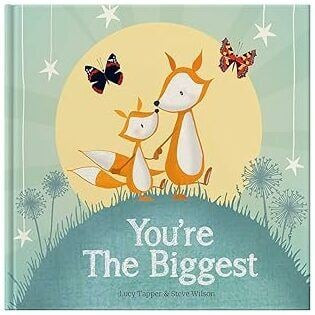
Alt Text: Cover of the book “You’re the Biggest” featuring an endearing illustration of a big brother and little sibling.
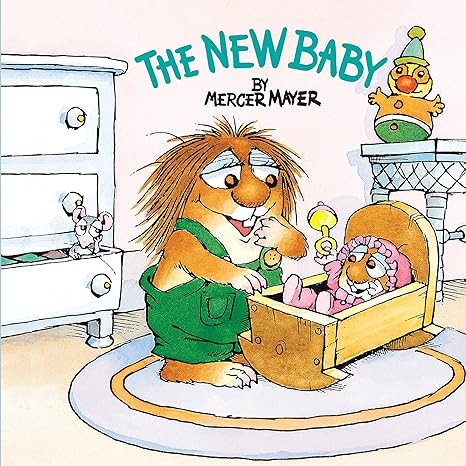
Alt Text: Book cover of “The New Baby” showcasing a heartwarming scene of a family welcoming a new baby.
Big Sister Focused Books:
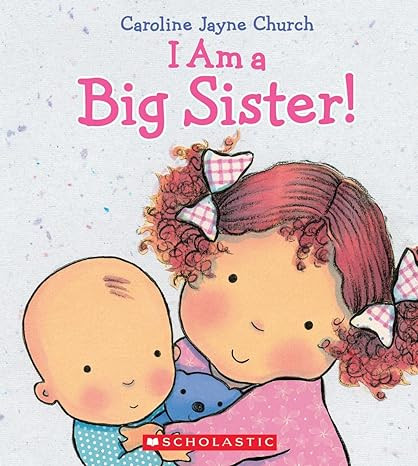
Alt Text: “I am a Big Sister” book cover, a cheerful book celebrating sisterhood with a new baby.
Big Brother Focused Books:
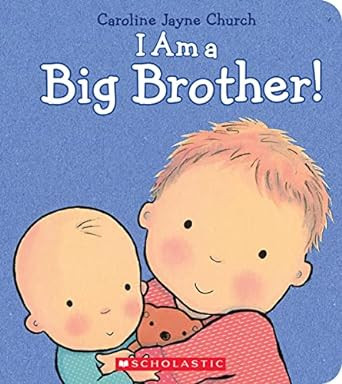
Alt Text: Cover art for “I am a Big Brother,” a book affirming the important role of a big brother.
Tips for the First Introduction
While preparing your child beforehand is crucial, the initial introduction to the new baby is also a significant moment. In my case, we opted to introduce my older child to the baby at home, which was partly influenced by hospital visitor restrictions during COVID, but it turned out to be a positive experience.
Interestingly, my older child’s primary excitement was about the sibling gifts! And that’s perfectly okay! We often have idealized expectations for this moment, but the best approach is to follow your child’s lead and allow them to react naturally.
Here are some helpful tips to keep in mind for the first meeting:
- Greet Older Children First: When you arrive home, greet your older children first, ideally without holding the baby. They have likely missed you, so give them a warm hug and make the initial moments about reconnecting with them.
- Neutral Baby Placement: Having the baby in a neutral space like a car seat or bassinet can be less overwhelming than immediately holding the baby. This is especially beneficial for younger children.
- Guided Interaction: Allow them to hold the baby if age-appropriate and they express interest, or guide them on safe ways to interact, such as touching the baby’s toes or gently patting the baby’s belly.
Related Reading: Space-Saving Nursery Ideas for Small Homes
Self-Care Tips for Moms Transitioning to Two (or More!)
Transitioning from one child to two (or more) is a significant adjustment for parents. While it deserves its own dedicated discussion, here are a few key tips to support you during the initial weeks:
- Embrace a Relaxed Housekeeping Standard: It’s okay if the house is not perfectly tidy. If household clutter is particularly stressful for you, communicate this to your partner so they can prioritize helping with household tasks or seek additional support.
- Stock Your Freezer with Meals: Having pre-prepared meals ready to go is invaluable, especially with more children to feed. Easy meals, like those for a slow cooker or oven, are a lifesaver when time is limited.
- Prepare Food for Older Child in Advance: Even simple tasks like preparing snacks or lunch for your older child can feel challenging in the early days. Prepare lunches the night before or during baby’s naptime to streamline mealtimes.
- Create Accessibility for Older Children: Make snacks and activities easily accessible to your older child, if they are old enough to manage independently. Organize activity bins with all necessary supplies for crafts, playdough, or other projects, empowering them to engage in independent play.
- Acknowledge the Challenge: Understand that the transition is demanding. Going from one to two children is a major shift for everyone. Be patient with yourself and know that you will find your rhythm as a family of [number]!
Embracing the Joy of Siblinghood with Thoughtful Gifts
Acknowledging and preparing your older children for a new baby is a testament to your thoughtfulness as a parent.
Presenting gifts to older siblings from the new baby is a time-honored way to foster excitement and positive anticipation about their new role as a big brother or sister.
Hopefully, the advice and big brother and big sister gift ideas shared in this guide will empower you to navigate this beautiful family transition with confidence and joy.

